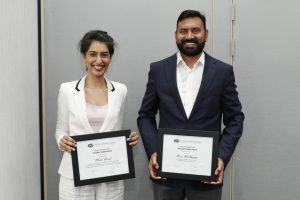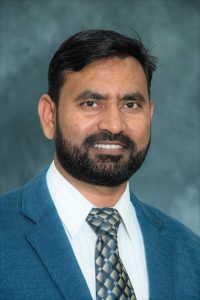 Noor Ul Hassan and Maha Yusuf Receive Awards
Noor Ul Hassan and Maha Yusuf Receive Awards
The ECS Energy Technology Division recognized the 2024 recipients of the Energy Technology Division Graduate Student Award Sponsored by BioLogic at the 245th ECS Meeting held in San Francisco, CA. Congratulations to Noor Ul Hassan of the National Renewable Energy Laboratory, recognized for advances in the understanding and performance of electrochemical fuel cells and electrolyzers, and Maha Yusuf of Princeton University for her scientific contribution to revealing three-dimensional morphological growth mechanisms and spatial heterogeneities of dead and active Li on graphite anodes, in situ, non-destructively in a full-cell lithium-ion battery under extreme fast-charging conditions
Award winners
 Noor Ul Hassan recently joined the National Renewable Energy Laboratory (NREL), Chemistry and Nanoscience Center, as a postdoctoral researcher with Dr. Bryan Pivovar. His research in the Hydrogen and Fuel Cells group at NREL explores the science behind polymer electrolyte fuel cells and water electrolyzer systems specifically focusing on improving performance and durability. Dr. Hassan received his PhD in Chemical Engineering from the University of South Carolina with Professor William Mustain, investigating various component level aspects of fuel cell and water electrolyzer systems such as electrode engineering and optimization, ionomeric binders, catalyst ink rheology, and porous transport layers. While working on his PhD thesis, he collaborated with various U.S. universities and national labs as well as foreign institutions in developing fuel cells and water electrolyzers. For his MSc at İstanbul Şehir Üniversitesi under the supervision of Prof. Bahadir Tunaboylu, and in collaboration with TÜBİTAK Marmara Araştırma Merkezi and Gebze Teknik Üniversitesi, he developed proton exchange membrane fuel cell stacks for small air-breathing unmanned aerial vehicles.
Noor Ul Hassan recently joined the National Renewable Energy Laboratory (NREL), Chemistry and Nanoscience Center, as a postdoctoral researcher with Dr. Bryan Pivovar. His research in the Hydrogen and Fuel Cells group at NREL explores the science behind polymer electrolyte fuel cells and water electrolyzer systems specifically focusing on improving performance and durability. Dr. Hassan received his PhD in Chemical Engineering from the University of South Carolina with Professor William Mustain, investigating various component level aspects of fuel cell and water electrolyzer systems such as electrode engineering and optimization, ionomeric binders, catalyst ink rheology, and porous transport layers. While working on his PhD thesis, he collaborated with various U.S. universities and national labs as well as foreign institutions in developing fuel cells and water electrolyzers. For his MSc at İstanbul Şehir Üniversitesi under the supervision of Prof. Bahadir Tunaboylu, and in collaboration with TÜBİTAK Marmara Araştırma Merkezi and Gebze Teknik Üniversitesi, he developed proton exchange membrane fuel cell stacks for small air-breathing unmanned aerial vehicles.
 Maha Yusuf is a Presidential Postdoctoral Research Fellow in the Department of Mechanical and Aerospace Engineering and Andlinger Center for Energy and Environment at Princeton University. Her research there combines her expertise in advanced neutron and x-ray-based characterization with physics-based modeling and 3D manufacturing to engineer anodes for long-life lithium-metal-free solid state batteries. She is co-advised by Prof. Kelsey Hatzell (Assistant Professor of Mechanical and Aerospace Engineering and Andlinger Center for Energy and the Environment, Princeton University) and Prof. Craig Arnold (Susan Dod Brown Professor of Mechanical and Aerospace Engineering, and Vice Dean for Innovation, Princeton University). Dr. Yusuf completed an MSc and PhD degrees in Chemical Engineering at Stanford University with support from the Schlumberger Faculty for the Future Fellowship and Diversifying Academia, Recruiting Excellence Fellowship. Advised by Prof. Michael F. Toney and Dr. Johanna Nelson Weker, her PhD research used advanced imaging diagnostic tools, particularly neutrons and x-rays, to understand the failure mechanisms of lithium ion batteries during extreme fast charging (XFC). Dr. Yusuf received awards including the 2022 ECS Edward G. Weston Fellowship, 2022 American Chemical Society Chemical Abstracts Service Future Leader Award, and 2020 Stanford Distinguished Student Energy Lecturer Award. Dr. Yusuf holds a BE in Chemical Engineering from National University of Sciences & Technology, Pakistan, following which she worked as a drilling engineer on oil and gas rigs in Colombia.
Maha Yusuf is a Presidential Postdoctoral Research Fellow in the Department of Mechanical and Aerospace Engineering and Andlinger Center for Energy and Environment at Princeton University. Her research there combines her expertise in advanced neutron and x-ray-based characterization with physics-based modeling and 3D manufacturing to engineer anodes for long-life lithium-metal-free solid state batteries. She is co-advised by Prof. Kelsey Hatzell (Assistant Professor of Mechanical and Aerospace Engineering and Andlinger Center for Energy and the Environment, Princeton University) and Prof. Craig Arnold (Susan Dod Brown Professor of Mechanical and Aerospace Engineering, and Vice Dean for Innovation, Princeton University). Dr. Yusuf completed an MSc and PhD degrees in Chemical Engineering at Stanford University with support from the Schlumberger Faculty for the Future Fellowship and Diversifying Academia, Recruiting Excellence Fellowship. Advised by Prof. Michael F. Toney and Dr. Johanna Nelson Weker, her PhD research used advanced imaging diagnostic tools, particularly neutrons and x-rays, to understand the failure mechanisms of lithium ion batteries during extreme fast charging (XFC). Dr. Yusuf received awards including the 2022 ECS Edward G. Weston Fellowship, 2022 American Chemical Society Chemical Abstracts Service Future Leader Award, and 2020 Stanford Distinguished Student Energy Lecturer Award. Dr. Yusuf holds a BE in Chemical Engineering from National University of Sciences & Technology, Pakistan, following which she worked as a drilling engineer on oil and gas rigs in Colombia.
ECS Energy Technology Division Graduate Student Award
The ETD Graduate Student Award was established in 2012 to recognize and reward promising young engineers and scientists in the division’s Technical Interest Areas. The award is intended to encourage the recipients to initiate or continue careers in this field. BioLogic has sponsored the award since 2017.
Learn more about the award and review the list of winners here.
The award’s nomination period is from March 15 to June 15, annually.
ECS Honors & Awards Program
The Society recognizes outstanding technical achievements in electrochemistry and solid state science and technology through its robust awards program. These opportunities highlight the contributions of our scientific community’s many deserving members. Learn more and submit a nomination!

